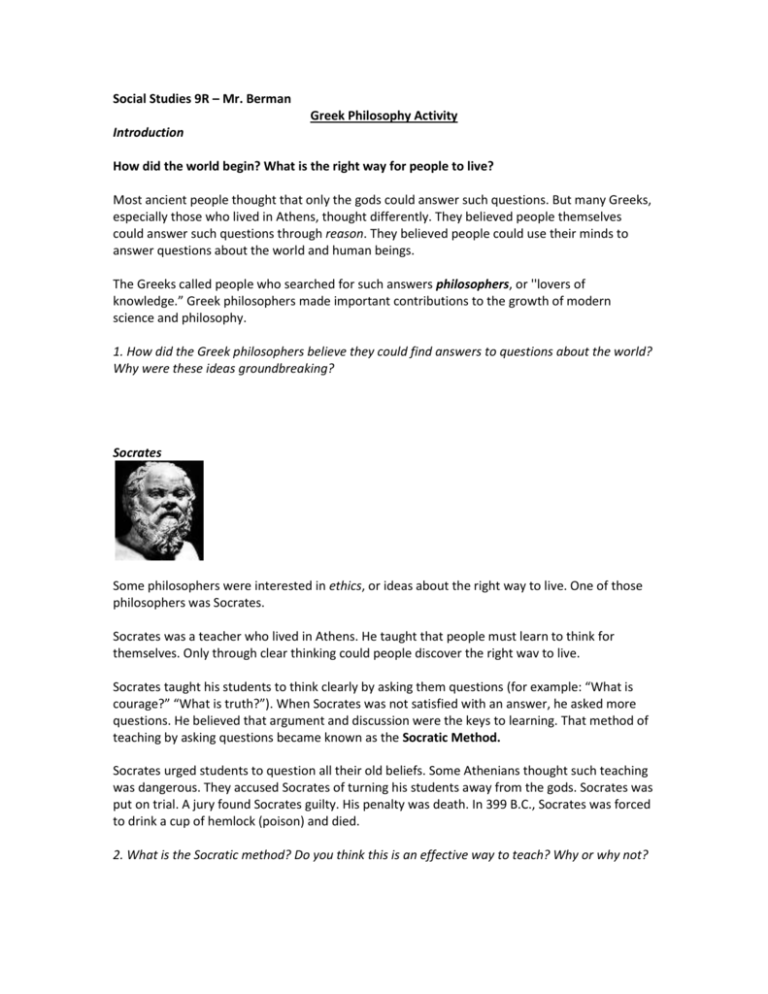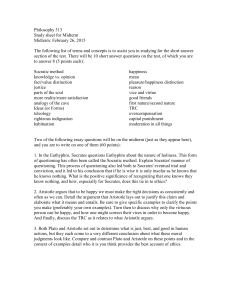Today`s handout - Manhasset Public Schools
advertisement

Social Studies 9R – Mr. Berman Greek Philosophy Activity Introduction How did the world begin? What is the right way for people to live? Most ancient people thought that only the gods could answer such questions. But many Greeks, especially those who lived in Athens, thought differently. They believed people themselves could answer such questions through reason. They believed people could use their minds to answer questions about the world and human beings. The Greeks called people who searched for such answers philosophers, or ''lovers of knowledge.” Greek philosophers made important contributions to the growth of modern science and philosophy. 1. How did the Greek philosophers believe they could find answers to questions about the world? Why were these ideas groundbreaking? Socrates Some philosophers were interested in ethics, or ideas about the right way to live. One of those philosophers was Socrates. Socrates was a teacher who lived in Athens. He taught that people must learn to think for themselves. Only through clear thinking could people discover the right wav to live. Socrates taught his students to think clearly by asking them questions (for example: “What is courage?” “What is truth?”). When Socrates was not satisfied with an answer, he asked more questions. He believed that argument and discussion were the keys to learning. That method of teaching by asking questions became known as the Socratic Method. Socrates urged students to question all their old beliefs. Some Athenians thought such teaching was dangerous. They accused Socrates of turning his students away from the gods. Socrates was put on trial. A jury found Socrates guilty. His penalty was death. In 399 B.C., Socrates was forced to drink a cup of hemlock (poison) and died. 2. What is the Socratic method? Do you think this is an effective way to teach? Why or why not? 3. One of Socrates most famous quotes is that “the unexamined life is not worth living.” Based on what you know about Socrates, what do you think he meant by this? Do you agree with this statement? 4. Athens decided to kill Socrates in 399 B.C., just five years after they lost the Peloponnesian War to Sparta. Why do you think many people in Athens would be scared of someone like Socrates at this moment in history? 5. Did Athens live up to the values Pericles discussed in In Praise of Athens when dealing with Socrates? Why or why not? Plato After Socrates died, his student Plato carried on his work. He opened “The Academy,” the first university in history, to train students and philosophers and continue Socrates search for wisdom. Unlike Socrates, who never recorded any of his ideas, Plato was a great writer. His most famous book is The Republic. It is still read today. In this book, Plato argued that democracy was not the best kind of government. He did not believe that most people could make good decisions about government. Instead, Plato imagined an ideal government where a small group of wise men that were educated and trained to be philosophers (called “philosopher kings”) would hold all the power and make decisions for the common good. 6. What did Plato write about government in The Republic? Are his ideas about government similar to any other philosophers we have learned about in this class? How? 7. Based on his life experiences, why do you think Plato had little faith in democracy? Aristotle The last great philosopher of Athens was Aristotle. He was a student of Plato. Aristotle was a brilliant man who explored all areas of learning. He wrote hundreds of books on science, government, philosophy, and other subjects. He believed a person could gain knowledge by making hypotheses and then testing those hypotheses through observation, experimentation and classifying information. This became known as The Scientific Method. Aristotle studied existing governments in his book Politics (unlike Plato, he did not try to come up with an ideal one). The form of government that he felt was best for society was a constitutional democracy (a system where the people have a voice in the government, and limits on the power of the government are established by a constitution). His books had a great influence on later philosophers and scientists. Aristotle even became the personal tutor to Alexander the Great when Alexander was a boy! 8. Name three significant achievements of Aristotle. How were his ideas about government different from Plato’s?







